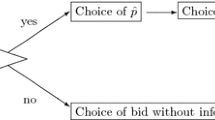Abstract
In this paper we consider the optimal design of English auctions with discrete bid levels. Such auctions are widely used in online internet settings and our aim is to automate their configuration in order that they generate the maximum revenue for the auctioneer. Specifically, we address the problem of estimating the values of the parameters necessary to perform this optimal auction design by observing the bidding in previous auctions. To this end, we derive a general expression that relates the expected revenue of the auction when discrete bid levels are implemented, but the number of participating bidders is unknown. We then use this result to show that the characteristics of these optimal bid levels are highly dependent on the expected number of bidders and on their valuation distribution. Finally, we derive and demonstrate an online algorithm based on Bayesian machine learning, that allows these unknown parameters to be estimated through observations of the closing price of previous auctions. We show experimentally that this algorithm converges rapidly toward the true parameter values and, in comparison with an auction using the more commonly implemented fixed bid increment, results in an increase in auction revenue.
Preview
Unable to display preview. Download preview PDF.
Similar content being viewed by others
References
Bajari, P., Hortacsu, A.: The winner’s curse, reserve prices, and endogenous entry: empirical insights from eBay auctions. RAND Journal of Economics 34(2), 329–355 (2003)
Bichler, M., Kalagnanam, J.: A non-parametric estimator for setting reserve prices in procurement auctions. In: ACM Conference on Electronic Commerce 2003, pp. 254–255 (2003)
Chwe, M.S.-Y.: The discrete bid first auction. Economics Letters 31, 303–306 (1989)
David, E., Rogers, A., Schiff, J., Kraus, S., Jennings, N.R.: Optimal design of english auctions with discrete bid levels. In: Proceedings of ACM Conference on Electronic Commerce, pp. 98–107 (2005)
Hageman, L.A., Young, D.M.: Applied Iterative Methods. Academic Press, London (1981)
Laffont, J.-J., Ossard, H., Vuong, Q.: Econometrics of first-price auctions. Econometrica 63(4), 953–980 (1995)
Levin, D., Smith, J.L.: Equilibrium in auctions with entry. American Economic Review 84(3), 585–599 (1994)
Lucking-Reiley, D.H.: Auctions on the internet: What’s being auctioned, and how? Journal of Industrial Economics 48(3), 227–252 (2000)
MacKay, D.J.C.: Information Theory, Inference and Learning Algorithms. Cambridge University Press, Cambridge (2003)
Myerson, R.: Optimal auction design. Mathematics of Operations Research 6(1), 58–73 (1981)
Press, W.H., Flannery, B.P., Teukolsky, S.A., Vetterling, W.T.: Numerical Recipes: The Art of Scientific Computing. Cambridge University Press, Cambridge (1992)
Riley, J.G., Samuelson, W.F.: Optimal auctions. American Economic Review 71, 381–392 (1981)
Rothkopf, M.H., Harstad, R.: On the role of discrete bid levels in oral auctions. European Journal of Operations Research 74, 572–581 (1994)
Rothkopf, M.H., Teisberg, T.J., Kahn, E.P.: Why are Vickrey auctions rare? Journal of Political Economy 98(1), 94–109 (1990)
Yamey, B.S.: Why 2,310,000 [pounds] for a Velazquez? An auction bidding rule. Journal of Political Economy 80, 1323–1327 (1972)
Yu, J.: Discrete Approximation of Continous Allocation Mechanisms. PhD thesis, California Institute of Technology, Division of Humanities and Social Science (1999)
Author information
Authors and Affiliations
Editor information
Editors and Affiliations
Rights and permissions
Copyright information
© 2006 Springer-Verlag Berlin Heidelberg
About this paper
Cite this paper
Rogers, A., David, E., Schiff, J., Kraus, S., Jennings, N.R. (2006). Learning Environmental Parameters for the Design of Optimal English Auctions with Discrete Bid Levels. In: La Poutré, H., Sadeh, N.M., Janson, S. (eds) Agent-Mediated Electronic Commerce. Designing Trading Agents and Mechanisms. AMEC TADA 2005 2005. Lecture Notes in Computer Science(), vol 3937. Springer, Berlin, Heidelberg. https://doi.org/10.1007/11888727_1
Download citation
DOI: https://doi.org/10.1007/11888727_1
Publisher Name: Springer, Berlin, Heidelberg
Print ISBN: 978-3-540-46242-2
Online ISBN: 978-3-540-46243-9
eBook Packages: Computer ScienceComputer Science (R0)



